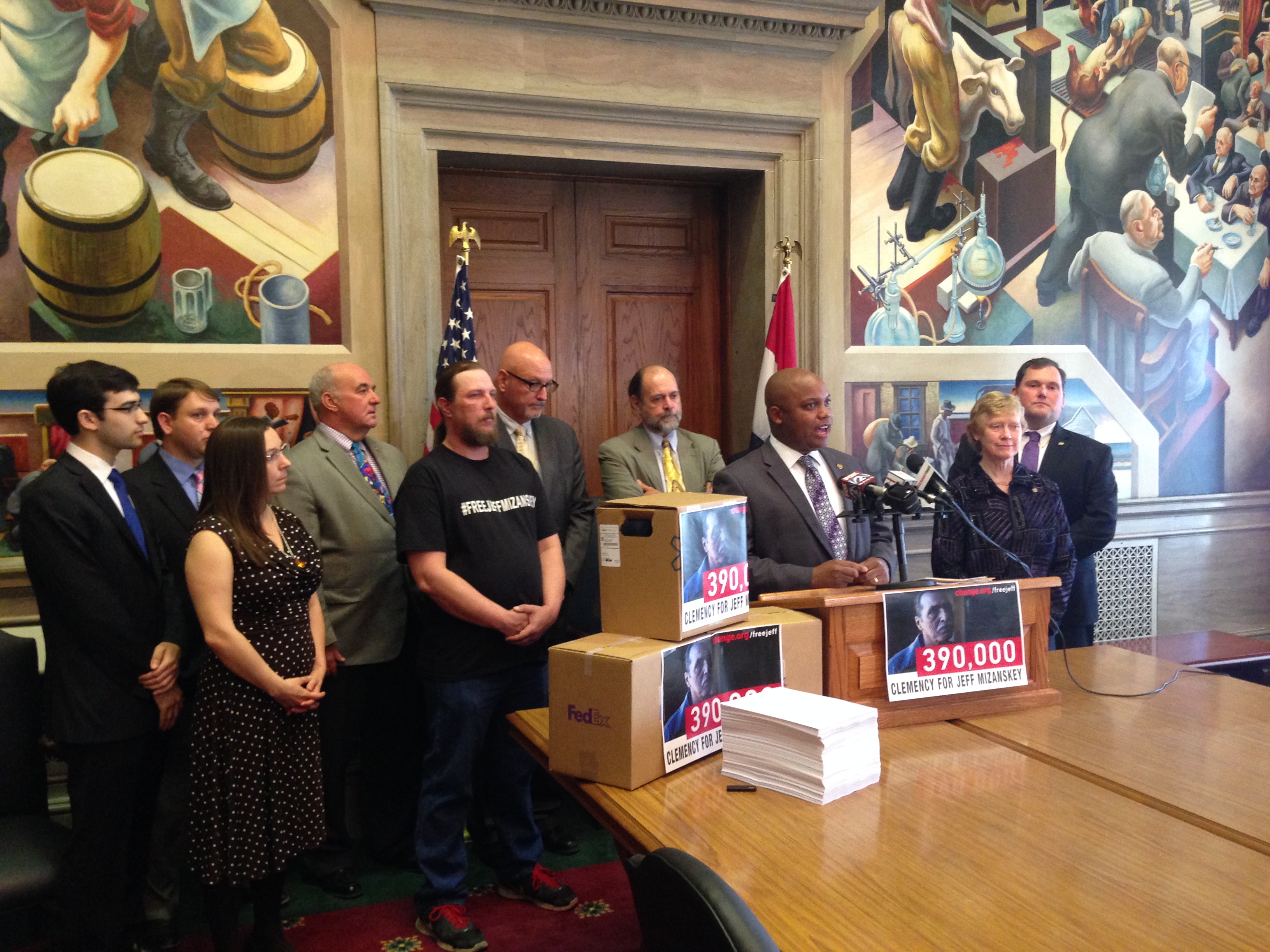JEFFERSON CITY, Mo. — Flanked by lawyers and a bi-partisan group of lawmakers, Republican freshman Rep. Shamed Dogan called on Gov. Jay Nixon to grant clemency to Jeff Mizanskey, who is 21 years into a life sentence in prison for purchasing seven pounds of marijuana.
Mizanskey was arrested in 1993 and in the last few years, has become the poster child for Missouri marijuana reform activists not just in Missouri but around the country. His petition for clemency on Change.org remains one of the most-signed petitions on the site to date.
Missouri police arrested Mizanskey in 1993 in a sting. Mizanskey had no violent offenses on his record at the time of his arrest and his only two brushes with the law came years earlier in the form of low-level marijuana arrests for possession. But when Mizanskey gave a friend to a ride to a Super 8 Motel — claiming repeatedly he had no idea the friend needed the ride to purchase several pounds of marijuana — he was arrested shortly after the exchange. While Mizanskey and his friend exchanged no money for the parcel and it was Mizanskey’s friend in possession of the brick when police surrounded them in the motel parking lot, he was arrested and charged with “possession of a controlled substance with intent to deliver and distribute.”
Mizanskey would be the only offender in the incident to fight the battle in court, claiming he had no idea his friend — who was the target of the sting — intended to buy marijuana until the deal was already happening. While his associate pled guilty and served 10 years, Mizanskey pled not guilty and was sentenced to life in prison without the possibility of parole under Missouri’s “three-strikes” law. Dogan said it was his decision to fight the case that landed him a harsh sentence.
“There is no way he would have gotten that charge if he had pled guilty,” Dogan told reporters. “But our system punishes people for going to trial.”
Missouri lawmakers moved to eliminate the “three-strikes” law for non-violent drug offenders last year in the massive re-write of the state’s criminal code, but the provision remains on the books until January 1, 2017.
Under the law, Mizanskey was eligible for his sentence because it was his third drug related offense, despite having never been accused of a violent crime. Mizanskey, now 62, is not eligible for parole.
Dogan offered a bill this year, now sitting on the House calendar for potential debate, that would require the state’s Board of Parole and Probation to free Mizanskey, who his lawyers say is in declining health. But Dogan said he actually hoped his bill would not pass.
“You won’t often hear a lawmaker say this but I actually hope my bill doesn’t pass,” Dogan said. “Because the best situation would be for Governor Nixon just to grant clemency today and make this legislative process unnecessary.”
Dogan, along with one of Mizanskey’s sons, lawyers, and several activists, printed the nearly 400,000 signatures for his clemency and walked them down to the second floor to hand deliver them to Nixon’s Capitol office.
Dan Viets, a lawyer working for the Mizanskey family, said his meetings with Nixon’s staff had been productive and that he believed the governor to be “seriously considering” the matter of clemency.
Some lawmakers qualified their support by saying they weren’t in favor of decriminalizing marijuana, but that the state needed to find less harsh ways of punishing non-violent offenders.
“There are many of us in the legislature that do not support decriminalizing marijuana, but some of these punishments and penalties…we have to take a look at it,” Rep. Kevin Engler, a Republican, said. “Do taxpayers really need to be putting out $17-20,000 dollars a year to incarcerate a person who smoked pot 20 years ago?”
Collin Reischman was the Managing Editor for The Missouri Times, and a graduate of Webster University with a Bachelor of Arts in Journalism.



